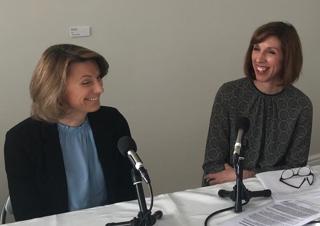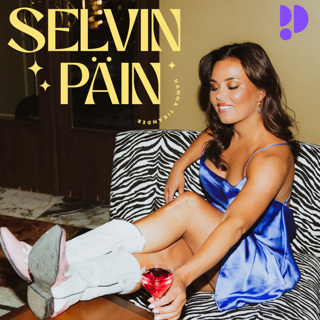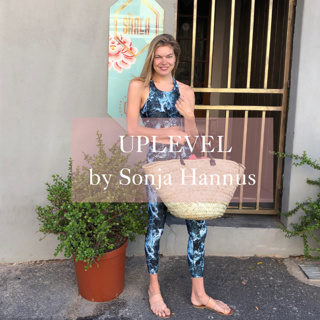
156 - Educating women, improving access to treatment and influencing those in power with Dr Sharon Malone
Dr Sharon Malone is an eminent American physician who has worked as an obstetrician and gynaecologist for over 30 years in Washington DC. After 15 years of working mostly as an obstetrician, Sharon changed to specialise in menopause care around the time of her own perimenopause. She is passionate about educating women to understand their own hormone journey and empower them with evidence based information about hormone treatments. The experts discuss the challenges of influencing and persuading medical colleagues on the benefits of hormone replacement, the importance of patient choice and agency, and the lack of menopause research and need for government funding. Dr Malone’s advice to women: Find your community of women who will support you and understand what you’re going through Be active, keep exercising regularly Maintain a healthy diet and eating habits; processed foods negatively affect so many aspects of your health To read or listen to Dr Malone’s Washington Post op ed, visit https://www.washingtonpost.com/opinions/2022/04/28/menopause-hormone-therapy-nih-went-wrong/ Dr Malone is the Chief Medical Officer at US based menopause company Alloy, to find out more visit www.myalloy.com
14 Kesä 202232min

155 - Weight loss, diabetes and menopause with Dr Clare Bailey and Dr Michael Mosley
Dr Clare Bailey is a GP and health columnist with extensive experience in helping people lose weight and improve their health. Dr Michael Mosley is a science presenter, journalist and executive television producer. Together, they have authored several bestselling books on weight loss, diet and diabetes and created the popular 5:2 and fast 800 diets. In this episode, the guests describe the evidence showing the positive effects of incorporating principles such as the Mediterranean style diet and time-restricted eating into your lifestyle and how the fast 800 diet can dramatically improve your health outcomes, particularly in reversing type 2 diabetes. The ‘metabolic car crash’ of poor sleep, low hormones, poor diet and weight gain for women during the perimenopause and menopause are also discussed. Clare and Michel’s top tips: Enjoy olive oil. You don’t have to be stingy with it – it’s good for you! Eat oily fish – remember SMASH: Sardines, Mackerel, Anchovies, Salmon, Herring. Avoid snacks (especially in the evenings) or if you have to, reach for a few nuts. For more information on Clare and Michael’s diet books and the fast 800 diet, visit thefast800.com Follow Clare’s recipes on Instagram @drclarebailey
7 Kesä 202232min

154 - How pharmacists can improve menopause care in your GP practice and community with Rupa Lyall
Rupa Lyall is a clinical pharmacist who works in a GP practice in Buckinghamshire seeing patients with minor illnesses and prescribing medications. In this episode she tells Dr Louise Newson how she became interested in the perimenopause and menopause and how, through the training on fourteenfish.com and resources on the balance website, Rupa now supports and educates other clinicians in HRT prescribing. Their conversation covers raising awareness among professionals, working with patients from BAME communities, the importance of empowering women to improve their quality of life and the transformational effects of hormone replacement. Rupa’s 3 tips for pharmacists interested in the menopause: Go to fourteenfish.com and do the ‘Confidence in the Menopause’ course Don’t be frightened of the menopause, learn more and talk to others Speak to patients about their HRT, ask them how they’re doing, especially in the community. You will learn a lot by doing this.
31 Touko 202228min

153 - Learning how to prescribe HRT as a GP trainee with Dr Thulasi Naveenan
In this episode, Dr Thulasi Naveenan talks to Dr Louise Newson about her experiences as a 3rd year GP trainee working in a central Manchester practice and learning on the job when it comes to HRT prescribing. The conversation covers working with patients from different cultures and with interpreters or family members, challenging misinformation, health risks after menopause and gender differences, and introducing the topic of hormones at 40-year health checks. Thulasi gives an honest and reflective account of what she has learnt about women’s health and hormones in her last 7 years of practising as a doctor. Thulasi’s advice to clinicians learning about menopause: Always have hormones in the back of your mind and there is no younger age limit cut off. Don’t be afraid to ask patients about their periods, vaginas and symptoms. Don’t be afraid to ask about what you don’t know, use resources like the balance app and NHMS to find out more information. Find your local expert and seek out their knowledge and experience. If you’re ‘junior’, don’t be afraid to challenge more senior clinicians – they may not be as up-to-date on the latest practice. You can follow Dr Thulasi Naveenan on Instagram at @tnaveenan and on Twitter at @ThulasiNaveenan Since the recording of this podcast, there has been further discussions with Cancer Research UK.
24 Touko 202232min

152 - Irritable bowel, bloating and digestive health with The Gut Experts
Consultant Gastroenterologist Professor Barbara Ryan and Clinical Dietitian Elaine McGowan are The Gut Experts, passionate about digestive health and helping women with debilitating bloating and irritable bowel symptoms. In this episode, the experts discuss why more women are troubled by gut related symptoms compared to men, how gut and bowel problems have a very real impact on women’s lives, and why eating the right type, amount and variety of foods is so important for your gut health and overall wellbeing. The Gut Experts also talk about their new book written for women of all reproductive ages experiencing gut and bowel related symptoms. Barbara’s tips for improving your future digestive health: If you’re having digestive symptoms seek a correct diagnosis rather than self-diagnosing Don’t look at your gut and digestive health in isolation, take a whole-body approach. Remember TEAMS: Total gut and body health, Exercise, Alcohol (reduce/cut out), Mental health, S Elaine’s tips for improving your diet: Fibre is a superfood for your gut microbiome – find the right amount of fibre intake for your own gut as everyone is different Variety and diversity of foods is crucial, eat the rainbow, following a Mediterranean style diet. Visit the Gut Experts website at https://thegutexperts.com/ The Gut Experts book, ‘What every woman needs to know about her gut’, contains solutions for bloating, IBS, and digestive symptoms and is out now, published by Sheldon Press. Follow Barbara and Elaine on instagram @thegutexperts
17 Touko 202234min

151 - Unpicking UTIs and the role of hormones with Dr Rajvinder Khasriya
Dr Rajvinder Khasriya is a urogynaecologist who leads the Lower Urinary Tract Symptoms clinic at the NHS Whittington Hospital in North London, and is also involved in research work at University College London. In this episode, the experts discuss urinary tract infections (UTIs) and the role a lack of hormones play in their occurrence and ongoing recurrence. Dr Khasriya explains how common and debilitating UTIs can be for women in the peri/menopause, why traditional methods of testing and treatment are often unsuccessful, and she outlines the benefits of using vaginal hormonal treatments as part of a holistic approach for managing UTIs. Dr Khasriya’s tips for women with UTIs: As always, do your own research and find patient groups for support and information. Understand all the factors that can contribute to UTIs such as weight gain, your general health, your diet and stress levels, as these are also important. Be generous when using your vaginal estrogen, it is completely safe to use and in the long term. Trust yourself, you know your body best. The patient groups: Embedded/Chronic UTI Support Group Do you suffer from reoccurring UTIs? Many of us have been previously incorrectly diagnosed with Interstitial Cystitis (IC) and have come to learn our condition is actually an embedded or chronic UTI... Home - CUTIC 1 in 3. women will have a UTI by the age of 24 1. 90%. of chronic urinary tract infections are missed by the standard MSU culture test 2. 70%. the risk of recurrence within a year 3. Bladder Health UK Women asked if bladder drug should be available to buy. A pill to help treat an overactive bladder - which affects millions of women - could soon be available to buy in the UK without prescription.
10 Touko 202229min

150 - The effects of trauma, gender bias and the peri/menopause with Dr Jan Smith
Dr Jan Smith is a chartered psychologist, executive coach, author, campaigner and the director of Healthy You Ltd. She has over 15 years’ experience providing psychological support to those affected by injury and clinical negligence. In 2014, Jan developed a birth trauma service and campaigns to improve safety in maternity services for families and staff and provides training in the UK and internationally to maternity students and healthcare professionals on birth trauma and its impact. In this episode, Jan describes to Dr Louise Newson how women can feel after a difficult birth or medical experience, and how trauma related emotions can resurface many years later at peri/menopause when psychological and genitourinary changes occur, often affecting relationships and intimacy. Jan’s 3 pieces of advice: If you had a difficult birth or healthcare related experience that affects how you feel about your genitals and intimacy, it is never too late to get help, even if it is years down the line. Workplaces need to view women’s health as a continuum, not separate stand-alone events like pregnancy or menopause. Think about ‘reaching in’ to help other women going through it – to listen, to validate and let them know they are heard and seen. This can be hugely beneficial for everyone’s mental health. For more about Jan and Healthy You, visit https://healthyyoultd.co.uk/
3 Touko 202230min

149 - What I have learnt since falling in love with menopause care with Dr Abbie Laing
In this episode, Dr Louise Newson speaks to Dr Abbie Laing about why she now specialises in menopause care and what she has learnt through her research and writing on the subject. Together the experts discuss clinical hot topics where misinformation and misunderstandings are rife such as what the evidence shows about the risk of clots and breast cancer with HRT, and treating symptoms of genitourinary syndrome of menopause (GSM) with vaginal estrogen. Abbie’s 3 tips for women with symptoms of GSM: Seek help early and use vaginal estrogen; persist with treatment options if the first one doesn’t suit you. The benefits are huge, and treatment should be long term. If you have recurrent UTIs, consider vaginal estrogen treatments . For elderly, frail, or very busy women, the vaginal estrogen ring (Estring) is a very effective and safe option. Vaginal estrogen treatments are very safe and do not have any associated risks, including for people who have had cancer. To access the treatment pathways discussed in this episode, become an associate of the Newson Health Menopause Society at www.nhmenopausesociety.org For more information on any of the treatments discussed, visit the balance website at www.balance-menopause.com
26 Huhti 202230min






















